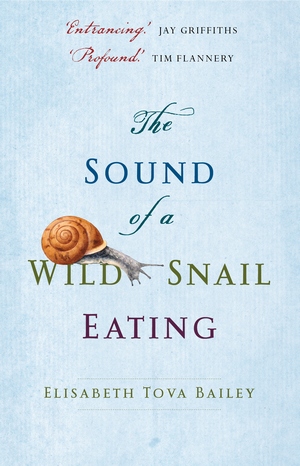I’ve just finished this sweet little book, The Sound of a Wild Snail Eating. It’s the memoir of a woman who gets sick and waits out her illness watching a little snail that a friend delivered to her in a flowerpot. She learns from the snail about slowness, although the snail moves faster than she does while she’s bedridden. Her understanding of the snail’s stillness over the course of 12 months mirrors her acceptance of her illness “standstillness”.
“The velocity of the ill, however, is like that of the snail,” Emily Dickinson.
If you’ve ever been sick or held back from everything that’s defined you for some reason, I reckon you’ll get this sweet journey. Elisabeth Tova Bailey was struck down with a particularly virulent strain of flu while travelling and it developed into a much more serious illness – something akin to CFS – which left her debilitated for almost twenty years. It was in the worst period that a friend gave her the little woodland snail as a (pretty weird!) gift.
The book opened me up. And it was beautiful to appreciate that some things have an inevitable pace. Meaning can be found in not moving, in being quiet. And that nature can find us and teach us what we need to know.
Happily, I was able to contact Elisabeth, who shared with me some thoughts on her illness. You might find it inspiring, especially if you’re reading this and currently experiencing illness. If you are…I send you my prayers…
Three Tips for Dealing with Illness, by Elisabeth
—When I was bedridden a friend rigged up my window shades so I could pull a cord to all three window shades at once thus opening them myself from bed in the morning, instead of having to wait in the dark for a helper to come.
—If you can’t get outside, terrariums are a great way to bring the outdoors into your home environment and they need very little care, since they rarely, if ever, need watering.
—Set up the space around your daybed with everything that you need right at hand. One friend once commented that my daybed looked like the inside of a rocket ship, as it had everything neatly organized around it.
1) Creatively solve the challenges of living with chronic illness so that you can still participate in the things you used to love to do:
—When I was too weak to sit upright to attend a favorite performance, a friend got permission for me to set up a cot on stage in the wings. So I enjoyed the concert horizontally and with a better-than-front-row-seat.
—When I couldn’t garden anymore there were times when I could still collect seed pods from plants at waist height and scatter seeds in other parts of the garden. I also invited friends who were making new gardens to weed my garden in exchange for taking as many plant divisions as they liked. These methods maintained my gardens for years.
—When I could walk only a short distance before needing to lie down, a friend built long wide benches in my woods. They were long enough that I could lie down completely, so I had resting places mid-walk.2) Find something new to get excited about that you’ve never done before.
—When I was too weak to sit up and hold a book, I switched over to audio books and have discovered many favorite narrators.
—When I was too weak to sing, I learned I could lie down and do “vocal toning” which is a healing way to use the voice.
—While I couldn’t be out hiking mountains or sailing or kayaking or dancing I could very slowly learn some tai chi3) Make your home environment as peaceful, beautiful, and nurturing as possible as chronic illness may cause you to spend more time there.
PS Bailey is not the author’s real name. It’s a pen name. I read in an interview her reasons for taking the nom de plume:
“Due to my illness, I really have to lead a very, very quiet life. I think it’s just a helpful buffer for me in that way.”
Quietness buffers. Yes. They’re a good thing!
Do you have quietness buffer ideas you might like to share with the rest of us?



